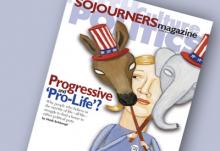Capitalism

Rev. Billy and his "Church of Stop Shopping" preach the gospel of love, anti-consumerism, and radical neighborliness.
When the Sago mine explosion trapped 13 West Virginia miners 250 feet below ground in January, I was deep into Kettle Bottom, a stunning collection of poetry by Diane Gilliam Fisher that i

Why the language of the marketplace shouldn't rule our moral and political thinking.
‘ Hear this, you that trample on the poor and take from them their jobs and retirement funds.
THANKS TO Walter Brueggemann for calling on us to challenge the capitalist system that causes such loss and pain for the powerless.
Former Treasury Secretary Paul H. O'Neill, an embarrassment to the Bush administration, was among the first to comment publicly on the Enron debacle in 2002, with a sound bite that is likely to endure as a signature statement of the market ideology of the Bush years:
"Companies come and go; it is part of the genius of capitalism."
The comment was a powerful disclosure of the governing ideology of our society. We may observe of that sound bite:
1) O'Neill spoke without any hint of irony. He seemed genuinely to believe his own mantra.
2) At the same time, however, we had to credit O'Neill, a consummate insider, with an immense cover-up in his utterance. He innocently suggested that capitalism is an unfettered system that operates unencumbered, all by itself. O'Neill, however, did not live in a bubble of isolation. He undoubtedly knew of the multiple covert manipulations by the key market players in their influence upon government, whereby the cards are stacked for the big ones and against the little ones.
3) One is struck in his sound bite by a remarkable lack of empathy for those who genuinely lose and suffer when "companies go," for the "going" is not simply a statistical fluctuation, but a huge displacement that includes loss of job and savings, and often thereby loss of home. O'Neill's dismissive slogan continued:
"Part of the genius of capitalism is people get to make good decisions or bad decisions, and they get to pay the consequences or to enjoy the fruits of their decisions."